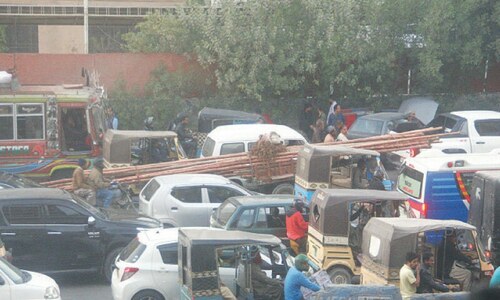KARACHI, Oct 31: The Karachi Water and Sewerage Board (KWSB) has stopped issuing daily reports of chlorine levels in water, in violation of an agreement reached with the provincial health department at a meeting around 12 days ago, it emerged on Wednesday.
According to the last report made public by the KWSB, the joint teams of the KWSB and the district health office had found nine water samples out of a total 25 (36 per cent) to be without chlorine. Both departments were carrying out daily checks of chlorine levels in wake of the rising cases of Naegleria which claimed 10 lives since May.
Initially, both the KWSB and the district health office (DHO) tested water in various towns and distributed the reports to higher-ranking officials in the health department and the media. However, to avoid ‘confusion and maintain transparency’ in the test results, it was decided in a meeting between the KWSB and the district health office on Oct 19 that water samples would be collected by joint teams of DHO field staffers and the KWSB, while the final report would be released by the KWSB laboratory.
However, according to a health official, the department hasn’t received a water report since Oct 24. The authorities have been demanding the reports from the KWSB, he added.
Karachi EDO health Dr Imdadullah Siddiqui said that the work was continuing as usual. He said that the district health office had been collecting water samples every day with the KWSB, but on a limited scale since the office was short-staffed. “Since we have limited staff the district health office teams collect samples with the KWSB in places at a greater risk,” said the EDO. “I don’t understand why the KWSB is not releasing the water reports.”
While replying to a question, the EDO said that as decided on Oct 19, his office had stopped issuing test results to the media, but was forwarding them on joint investigation to the provincial health department as per routine.
When contacted by Dawn, the focal person for the KWSB’s Naegleria Fowleri monitoring cell, Azam Khan, said that his cell had been working as usual and the joint everyday surveys were also under way.
He said that the reports were also being compiled and authenticated by district health and KWSB officers, and then being forwarded to KWSB officials for their perusal. He said that he didn’t know why the managing director secretariat was not releasing the reports to the media.
However, said Mr Khan, this might be because of the change in weather and losing attention from the issue since no new case of Nagleria had been reported recently so there was little need for the intensive chlorination. “I personally understand that the crisis is over now,” he concluded.















































Dear visitor, the comments section is undergoing an overhaul and will return soon.